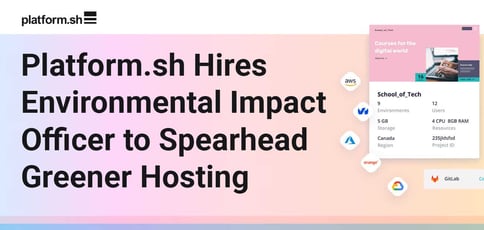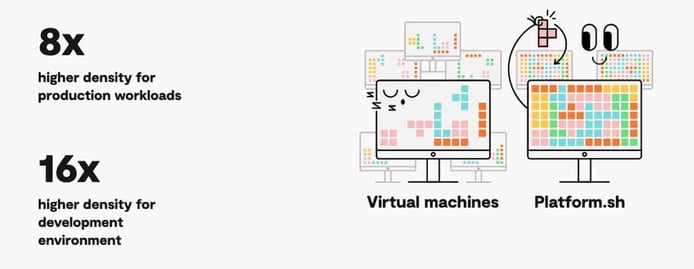
TL; DR: Platform.sh recently hired Leah Goldfarb as its Environmental Impact Officer, the first position of its kind in the PaaS industry. Under her guidance, the Platform.sh team looks to expand its greener hosting initiatives and fulfills its MODE approach. The MODE approach includes measuring its cloud computing impact, optimizing infrastructure to reduce resource use, deploying to greener datacenters, and educating clients and the public. Establishing climate-friendly efforts in-house and beyond remains at the forefront of Platform.sh’s goals.
People use the internet for all kinds of tasks, but they don’t often think about what powers the content they see every day. Servers across the globe have helped create the web as we know it. These servers, which live in facilities called datacenters, allow users to host websites and transfer content from point A to point B.
Although they may seem invisible to users, servers require massive resources and energy to run. Datacenters must have a cool and controlled environment to keep servers from overheating. The problem is that the energy needed to keep servers cool emits large amounts of carbon dioxide. In fact, the electricity used by the internet represents roughly 4% of global carbon emissions.
As cloud networks become the top hosting choice, their environmental impact will need to be addressed. Many companies within the hosting industry have made climate pledges and created eco-friendly initiatives to reduce their impact on the globe, but many others aren’t doing enough.

Platform.sh has taken its efforts to the next level by creating a department devoted to sustainability. Platform.sh recently hired Leah Goldfarb as its Environmental Impact Officer to spearhead the organization’s greener hosting initiatives. This position is the first of its kind for the PaaS industry.
Leah has a lengthy history in the environmental science landscape and has been taking on climate issues for years. Before she joined Platform.sh, Goldfarb served as Senior Science Officer at the Technical Support Unit of the Intergovernmental Panel on Climate Change. Before that she worked as a Science Officer at the International Science Council serving as a liaison with the United Nations on matters of sustainable development. She would often write climate reports but found that international decision-makers wouldn’t act on them. When she saw the Platform.sh position opening, she didn’t hesitate to apply as she could use her experience to make an impact.
“So I started in March this year, and by then, Platform.sh’s greener hosting offer had already been established. And I’m helping them scale this up,” said Leah.
Following the MODE Approach: Measure, Optimize, Deploy, Educate
Platform.sh’s mission to reduce its environmental impact stands on an in-house approach that goes by the acronym MODE. The MODE approach follows four principles: measure, optimize, deploy, and educate. Measuring is a crucial first step for the company to gain insight for planning and management going forward.
“Platform.sh is a signatory to the Climate Act. As part of that, we agreed to have a full scope one, two, and three for our carbon emissions. That was done in 2020, and we’re working on our 2021 carbon audit right now. So we take this seriously to measure accurately. By doing so, we’re able to identify the areas that will have the biggest impact,” said Leah.
One way Platform.sh addresses its impact is by optimizing cloud infrastructure. Platform.sh leverages high-density computing, which allows it to reduce its resource and server usage by 12 times. Many companies underuse their server capacities and instead allocate more servers to power their business. Platform.sh combats this practice and deploys more application workloads on fewer resources without affecting performance.

“Our clients can also work through code profiling. And Blackfire is now a part of the platform that allows developers to see where there are bottlenecks, identify them, and then reduce the CPU usage this way, which also reduces emissions,” said Leah.
Blackfire allows clients to join in the fight against climate change by giving them visibility into their code production. This way, they can monitor and optimize their performance to reduce resource use. Platform.sh also lets clients choose where to deploy for datacenters and provides them with a clear view of carbon emissions across the location grids. Last but not least is education.
“The last part is to educate, and that’s generally what we do. We educate ourselves through research. And then we go to international fora and discuss our approach,” said Leah.
Steering Clients to Greener Datacenter Locations
Renewable energy produces far fewer emissions than other sources. Many businesses, including top public cloud providers, weave these energies into their datacenter grids to lower their carbon footprint. They use power purchase agreements, an arrangement with the energy provider that allows the company to install renewable energy sources on the customer’s property in exchange for a fixed price on the energy the customer consumes.
Companies may also offset their carbon footprints by purchasing renewable energy credits. Leah told us providers must buy renewable energy with credits on the same grid for it to be a one-to-one carbon replacement. What Platform.sh does is provide information and analysis on location-based computing, which tells clients the amount of carbon dioxide being admitted on the grid that supports a particular datacenter.
“Most people don’t think about this when they deploy. They just pick a server close to them, and they might not think as much about the supporting grid. So we allow customers to choose if they want to deploy to a greener center,” said Leah.
With its location-based approach, Platform.sh guides customers to greener deployments while educating them on the connection between the grid and carbon emissions with full transparency. Leah explained that low-carbon regions, such as France, use nuclear energy to power their grid, while others rely on hydro.
Customers can explore electricity maps to view and understand actionable data quantifying carbon emissions across 50-plus countries. Leah said one thing that separates Platform.sh from hyperscalers and competitors is its focus on location and communication.
“As a multicloud provider, because we don’t own the datacenters, we can allow someone to go to a cleaner region. Most developers don’t care so much whether they’re on Amazon, Google, or Azure. If they can pay the same amount of money and save carbon, then that’s a win,” said Leah.
Establishing Sustainability Efforts In-House and Beyond
Leah told us climate change is a complex subject, but learning about it is the first step to creating change. That is why Platform.sh sets out to educate the public on the various updates in the space. Platform.sh CEO Fred Plais spoke at the TechCrunch Climate Summit in June 2022 to discuss reducing cloud impact. Leah also spoke at multiple seminars, including VivaTech 2022.
The Platform.sh team just updated its greener hosting webpage with new material. This page allows visitors and customers to find all its green initiatives and efforts in a single, central location.
The Platform.sh workforce is 100% remote, a policy it established to reduce its carbon footprint. It recently hired a sustainability coordinator, Dr. Deniz Evrard, to advance the team’s internal green projects, including a climate-friendly travel policy.
“Our sustainability coordinator will be working on initiatives involving the community, workers, what we’re doing internally. We also have a diversity, inclusion, and equity committee that’s looking at the social aspects of all of this,” said Leah.
As for what’s next for the company, it recently partnered with MongoDB to allow Platform.sh users to scale and build modern applications faster with integrated database and security tools. For Leah’s six-month outlook, her upcoming goals will focus on giving customers a clearer view of carbon issues.
“More observability and transparency around carbon will become important as we go forward here, being clear on the methods that we’re using to calculate the carbon emissions and doing this through a shared responsibility model between businesses and the clients. So we’re all on the same page,” said Leah.


